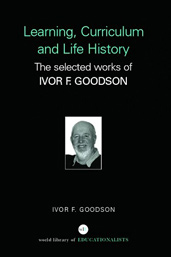Learning, Curriculum and Life Politics: the selected works of Ivor F. Goodson
Towards a Social Constructionist Perspective
The exhortation to re-embrace life history methods was first detailed in an article in 1981 (Goodson 1981). This was taken up in a study of Teachers' Careers undertaken by Sikes, Measor and Woods (1985). They were from the beginning aware of the substantial problems and commented that 'life histories do not present themselves to as a fully-fledged method ready to use. There is, as yet, no substantial body of methodological literature to support life history studies' (Sikes, Measor and Woods 1985, p.14). Nevertheless their work in Teachers' Careers: Crises and Continuities does provide us with important insights on teachers' lives and careers. Other work such as Bertaux's collection Biography and Society (1981), and Ken Plummer's excellent Documents of Life (1983), begin the rehabilitation of life history method and the exploration of the substantial methodological and ethical problems that such work entails.
Yet beyond problems intrinsic to the life history methods are problems of relationship to other foci and modes of analysis and investigation. As Mannheim warned in 1936 'Preoccupation with the purely individual life-history and its analysis is not sufficient' (Mannheim 1972). Above all, and rightly, I suspect, Mannheim is railing against individualism. What he calls 'The fiction of the isolated and self-sufficient individual.' Plainly given the powerful legacy of individualism and of individualist assumptions present in so many epistemologies this danger must be continually scrutinised with regard to life history work. As Mannheim says: The genetic method of explanation, if it goes deep enough, cannot in the long run limit itself to the individual life history and the more inclusive group situation. For the individual life history is only a component in a series of mutually intertwined life histories ... it was the merit of the sociological point of view that it set alongside the individual genesis of meaning the genesis from the context of group life (Mannheim, 1972, p.25).
Life history study pursued alongside the study of more collective groupings and milieu might promote better integration in a study of differing foci. The problem of integration is of course partly a problem of dealing with modes and levels of consciousness. The life history penetrates the individual subject's consciousness and attempts also to map the changes in that consciousness over the life cycle. But at the individual level as at other levels we must note that change is structured, but that structures change. The relationship between the individual and wider structures is central to our investigations but again it is through historical studies that such investigations can be profitably pursued:
Our chance to understand how smaller milieux and larger structures interact, and our chance to understand the larger causes at work in these limited milieux, thus require us to deal with historical materials (Mills 1970, p.165).
Ultimately we are back with the integrative focus suggested by C. Wright Mills as essential for all good social science.
Social science deals with problems of biography of history and of their intersections within social structures. That these three -biography, history, society, are the coordinate points of the proper study of man has been a major platform on which I have stood when criticizing several current schools of sociology whose practitioners have abandoned this classic tradition (Mills 1970, p.159).
In curriculum study the relationship between the individual teacher's life and the pre-active and interactive curriculum will allow insights into structuration as well as action. For as Esland has argued:
Trying to focus the individual biography in its socio historical context is in a very real sense attempting to penetrate the symbolic drift of school knowledge, and the consequences for the individuals who are caught up in it and attempting to construct their reality through it (Esland 1971).
